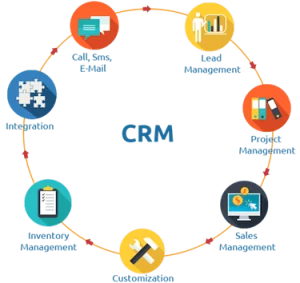In today’s fast-paced business world, staying ahead means leveraging the best tools available. One of the most impactful tools at your disposal is a Customer Relationship Management (CRM) system. But what makes CRM systems an absolute game-changer for businesses of all sizes? Let’s break it down.
What is a CRM System?
A CRM system is software designed to help businesses manage their interactions and relationships with current and potential customers. By organizing customer data, sales trends, and marketing campaigns in one central location, CRMs streamline processes and improve profitability.
These systems offer a comprehensive solution for tracking every customer interaction, from initial contact to post-sale support. By centralizing this data, businesses can make more informed decisions, improve customer satisfaction, and drive growth.

The Importance of CRM Systems in Modern Business
The value of a CRM system cannot be overstated. In the age of data, having quick access to customer information is crucial. A CRM system not only stores this data but also analyzes it to provide actionable insights.
CRM systems also enhance communication across departments. When everyone has access to the same customer data, teams can collaborate more effectively. This unified approach improves customer service, as each team member is well-informed and can provide personalized support.
Key Features of a CRM System
Contact Management
Contact management is the core feature of any CRM system. It allows businesses to store and manage customer information, such as names, phone numbers, email addresses, and social media profiles. This feature ensures that all customer data is easily accessible and up-to-date.
Sales Management
CRM systems come with powerful sales management tools. These tools track sales activities, manage sales pipelines, and forecast future sales. By providing a clear view of the sales process, CRMs help sales teams close deals faster and more efficiently.
Marketing Automation
Marketing automation features streamline marketing efforts by automating repetitive tasks. CRMs can manage email campaigns, social media posts, and other marketing activities. This automation saves time and ensures consistency in marketing messages.
Benefits of Using a CRM System
Improved Customer Relationships
By centralizing customer data, CRM systems provide a complete view of each customer. This holistic view enables businesses to offer personalized experiences, which strengthen customer relationships and foster loyalty.
Increased Sales
CRM systems help sales teams prioritize leads and opportunities. By focusing on high-value prospects, sales teams can close deals more effectively. Additionally, CRMs provide insights into customer behavior, enabling sales teams to tailor their approach.
Enhanced Productivity
CRMs automate many administrative tasks, freeing up time for employees to focus on more strategic activities. This increased efficiency boosts productivity and allows teams to achieve more in less time.
Choosing the Right CRM System
Assessing Your Needs
Before selecting a CRM system, it’s essential to assess your business needs. Consider factors such as the size of your business, the complexity of your sales process, and your budget. Understanding your requirements will help you choose a CRM that meets your specific needs.
Evaluating Features
When evaluating CRM systems, pay close attention to the features offered. Look for systems that include contact management, sales management, marketing automation, and analytics. Ensure that the CRM you choose aligns with your business goals.
Considering Ease of Use
A CRM system should be user-friendly and easy to implement. Look for systems that offer intuitive interfaces and comprehensive training resources. A CRM that is easy to use will increase adoption rates and ensure that your team gets the most out of the system.
Integrating CRM Systems with Other Tools
Email Integration
Email integration allows you to manage customer communications directly from your CRM. By connecting your email platform with your CRM, you can track email interactions, automate follow-ups, and ensure consistent messaging.
Social Media Integration
Integrating social media with your CRM enables you to monitor customer interactions across various platforms. This integration provides valuable insights into customer behavior and preferences, allowing you to tailor your marketing strategies accordingly.
Analytics Tools
Analytics tools help you measure the effectiveness of your CRM efforts. By integrating analytics with your CRM, you can track key performance indicators, identify trends, and make data-driven decisions to improve your business processes.
The Future of CRM Systems
Artificial Intelligence
The future of CRM systems lies in artificial intelligence (AI). AI-powered CRMs can analyze vast amounts of data to provide actionable insights. These insights enable businesses to make more informed decisions and improve their customer relationships.
Mobile Solutions
Mobile CRM solutions are becoming increasingly popular. These solutions allow employees to access customer information and manage interactions from their mobile devices. This flexibility enhances productivity and ensures that teams can work effectively from anywhere.
Enhanced Personalization
Future CRM systems will offer even greater personalization capabilities. By leveraging advanced analytics and AI, CRMs will provide more tailored experiences for customers. This personalization will strengthen customer relationships and drive business growth.
Conclusion
CRM systems are a vital tool for modern businesses. They streamline processes, improve customer relationships, and drive growth. By choosing the right CRM system and implementing it effectively, your business can reap the benefits of this powerful technology.
Take the next step in transforming your business with a CRM system. Explore different options, assess your needs, and choose a CRM that aligns with your goals. With the right CRM in place, you’ll be well-equipped to succeed in today’s competitive business landscape.
To read more content like this, subscribe to The Brand Hopper




